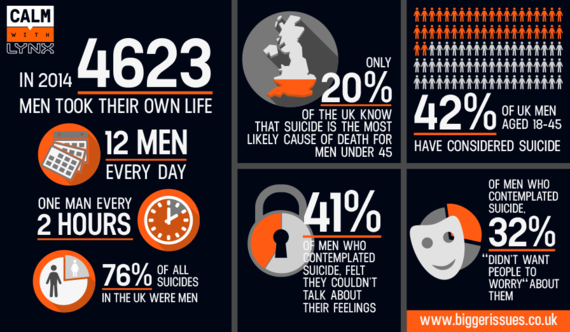This article may contain triggers -- please read with caution.
Male suicide is one of the greatest problems of our time and yet one of the least talked about topics. What many don't realize is that suicide is the leading cause of death in men under 45 in the U.K., the second leading among male 15-24 year olds in the U.S. and one of the top causes of death worldwide. This is all despite the fact twice as many women get diagnosed with depression. Just have a little think about those facts for a few seconds. It's not cancer, or road accidents, or some other topic the media loves to run with like global warming that is predominantly killing men, it's suicide.
The trouble is that "suicide" and "mental health" aren't sexy topics that the tabloids can print on their front pages with some terrible pun of a headline to churn out copies. They want stories that sell. They want to talk about Trump's hair or Kim Kardashian's latest nude selfie, and all the while the male suicide rate sits quietly in the background, as big a problem as ever but overshadowed by the irrelevance that gets printed and tweeted.
But this isn't a problem that we can simply sweep under the rug and let it be dealt with by someone else. The World Health Organization notes that every 40 seconds someone tragically takes their own life, and the male suicide rate has been on the rise over recent years. In the U.K. alone, it is now over a third higher than it was in 1990 and has seen a 15 percent increase in the US since 2005.
Despite more women suffering from depression, four times as many men are likely to take their own life compared to women in the U.S. Four times. The problem is with masculinity. Men are traditionally, and archaically, seen as the "breadwinners," the strong ones who support their family while the "stay at home mother" looks after the kids. But life just isn't like that anymore.
While there are still issues of inequality throughout the world, we see women striving to break through the stereotypes in place by achieving great things, but we don't see this same commitment from men to opening up.

Stats for the U.K.'s male suicide rate in 2014, source: Lynx X CALM
Very few men like to admit their feelings or emotions or show any sign of weakness. They fear that once they open up they will be seen as less masculine. They're thinking like the primates we once were -- "who will want to marry me if I talk about my feelings?!" Does talking about depression make me a woman? Does writing about my own experiences with suicide make me any less of a man? Of course not, and the people who think it does need to pull themselves out of the time warp from 600 years ago and get with the 21st century.
Suicide needs to be spoken about on two fronts. Firstly, the media. The media loves talking about the Zika Virus, or Ebola, or whatever other Walking Dead-esque disease it is that they can scare the population with. I'm not saying these issues aren't important, but more talk about suicide could have a huge impact. This doesn't mean giving a newspaper column to any "I was on TV once, please listen to me, please!" "celebrity" like Katie Hopkins who, despite never suffering from depression, once wrote on the topic that, "People with depression do not need a doctor and a bottle of something that rattles. They need a pair of running shoes and fresh air." Ah damn, if only I'd stuck my head out of the window and gulped down some fresh air I could have saved myself two years of depression, thanks Dr. Hopkins!
It's not okay that people with a large platform like hers are allowed to comment on issues she has no understanding of, especially when these are issues people are physically taking their own lives over. I can take a joke as much as the next man but come on, stick to what you know (whatever that actually is).
Secondly, we need to have a bigger conversation amongst ourselves. If you're a woman, let the men that you are friends with know that they can be honest with you, about anything, and it won't change your relationship. If you're a man, start this conversation yourself. If your sole aim in life is to be a group of "top lads," know that this is still possible by being open and emotional. Being honest about what you're going through makes you so much more of a man than you may know, because it takes real courage to stand up and say something when the chips may be stacked against you. If we start a greater conversation around suicide, do away with the stigma and let men know that it's okay to admit how they're really feeling, they will seek the help they desperately need.
If you're struggling, open up to someone. Suicide and depression feed off the secrets, and one conversation can kick-start your recovery in a way you would have previously thought impossible; it did with me. Talking actually combats the depression. Opening up about your struggles doesn't mean you have to declare it from the rooftops, it can be as simple as having a chat with your doctor. Get the help you need.
I promise full recovery is 100 percent possible. I know because I've done it.
Get in touch at hello@georgebell.co, find me on my personal site here, follow me on Twitter and check out my blog on mental health issues.
___________________
If you -- or someone you know -- need help, please call 1-800-273-8255 for the National Suicide Prevention Lifeline. If you are outside of the U.S., please visit the International Association for Suicide Prevention for a database of international resources.